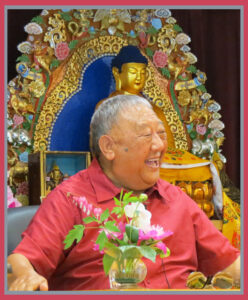My subject is wisdom. When you have learned how to focus, then you focus on wisdom. Why? Truly speaking, wisdom is the only thing that can cut the root of samsara. Remember I told you when I was in Washington, talking in that mall, a lady raised a question, “Where is all this suffering coming from?” And I said, “Me, me, me.” And then Thurman said, “Looks like all your sufferings are created by Rimpoche.” But the reason I said, “Me, me, me,” is the first verse of Chandrakirti’s commentary on Nagarjuna’s root text, in which he asks, “Why don’t we have control of our lives, and why are we in this spin cycle?” You know, when you wash clothes, at the end they go into the spin cycle? Then Chandrakirti goes on, “The first thing is ‘I and I’ and then it is ‘mine and mine’.”
We cannot throw off the “I,” and therefore, we cannot throw off the “mine.” “I” and “my” are attached together. We start spinning because it’s “mine,” and “I” can’t let it go. “This is mine; I want this,” or “I don’t like this”—all those things come up. That’s how we get into this spin cycle. The essence point in Buddha’s experience is cutting out that “me.” That sounds strange. We will easily agree that we would like to cut our ego, but do we know the difference between our ego and “me”? No, we don’t. That is the problem. But it is very simple. I’m not functioning. My ego is functioning. I am totally smashed and totally taken over by my ego. It is like the Chinese emperor sitting there nicely with all his retinues and queens and concubines and also opium and everything. But actually, who is functioning to govern the country? The ministers are functioning. So it is hard for me to make the distinction between my ego and me because I’ve been completely smashed and overpowered and put aside by ego’s functioning.
My ego is so touchy and so sensitive. Anything happening, good and bad, is so touchy and so sensitive. That’s why we create negativities. Negative emotions come because of that. Can we be emotion-free? No. As I told you, if you take those five mental faculties away, you will be sort of like a robot, this electrical person, with a little mind that is not intelligent enough. So you can’t be without emotions; you cannot be free of emotions at all. But you can be free of negative emotions. If “I” am functioning, the emotions will be positive ones. The positive emotions won’t function when the ego is in control: only the negative emotions function. That’s because the ego’s object is again, the “me, me, me; my, my, my,” business.
In Tibetan we call that dag dzin, “self-grasping.” The Buddha’s way of making himself free is defeating the ego —totally. So it is ego-less-ness. some people will say selflessness, but I don’t know about that. Ego-less-ness is the important point. When you have the power to concentrate, when you establish shamatha, then the vipasyana should be able to see the ego-less-ness of me and the ego-less-ness of every existence. That’s the reason why it’s called vipasyana, special seeing. The combination of these two together, shamatha and vipasyana, is the recommended vehicle on which you can travel to enlightenment. Without these things, the three moralities plus shamatha and vipasyana, one does not reach enlightenment at all. You have to have these things. This is the abbreviated version of the lam rim. With that we have almost covered the sutra part of the Foundation of Perfections. Next is the tantra part.
~ Gelek Rimpoche, Foundation of All Perfections, 2013, P. 172


